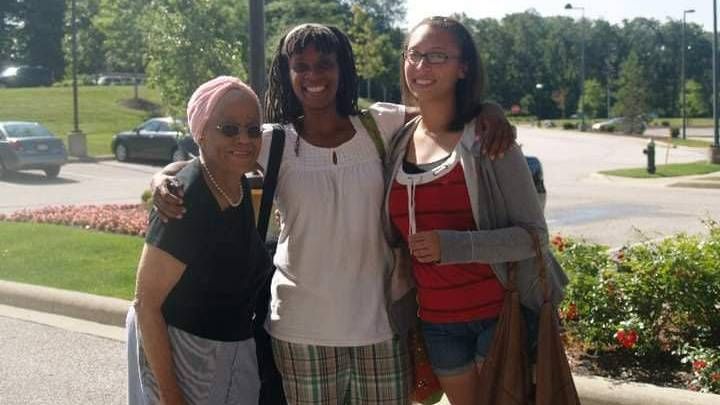How Generational Trauma Affects Our Financial Wellbeing

What I want our communities to talk about: how generational trauma affects our financial wellbeing. We can learn and unlearn traumatic events that might be affecting us today, unconsciously sabotaging our own wellbeing.
This article originally appeared in the Minnesota Women's Press on February 24, 2020.
Have you ever woken up from sleep and felt anxiety as you reached for your phone to open the bank app to check your balance? As you wait for your fingerprint on the phone to be identified, you run through in your head every bill that needs to be paid. It is payday and you nervously await the verdict: “How much will my paycheck cover?”
I grew up in a low-income, single-parent household. My mother worked full-time, but we did not have discretionary money for anything. The only reason to check the mail was in anticipation of her paycheck. Otherwise it was bills and junk mail. "Broke" was a term I learned early.
As I have grown into adulthood, I realize I have never had what many would consider a healthy relationship with money. In talking with friends who are women of color like me, I discovered that many of them have similar issues. I began to wonder if there might be something to learn there and set out to discover what that might be.
What I found is that, for many of us, there is trauma associated with finances — trauma that has been carried through many generations.
We talk about the effects of historical trauma related to oppression and being marginalized. The intense emotions that come with financial struggles, however, are rarely mentioned. The shame, guilt, feeling of being gaslighted by your own bank account, memory loss over spending, paranoia that you were overcharged, and mistrust that you are underpaid are all part of the constant stress about money for so many women.
Women have increasingly become the sole provider for our households. We have obtained the highest rates of education and are progressively landing more management and leadership positions. Even in cases where men are a main household provider, women still play a vital role in making key decisions about how the money is spent.
However, there have been fierce and sudden changes in family structure caused by a history of patriarchy and white supremacy. Men continue to be torn from their families — lynched, imprisoned and deported — leaving women to deal with the aftermath. Most women have never been taught to be confident with money.
There are so many unconscious ideas embedded in our relationship to money, generally tied to our sense of worth and value, and associated with crisis. Financial trauma is pervasive, yet largely unaddressed.
A study on disparities from Minnesota Compass indicates that people of color are more likely to live in poverty, less likely to own a home and tend to stop short on educational goals. Although disparities are rooted in historical experiences of oppression and exclusion, data shows that gaps can be explained by insufficient income, unhealthy environments and inadequate access to opportunities. The report concludes, “We can address all of these.”
Poverty is one of the legacies of historical trauma. Many white communities have accumulated wealth that gets passed down. In communities of color, however, we often need to help our parents pay bills at an early age, and education is disrupted by doing childcare, cooking and cleaning while parents struggle to earn. If you are from an immigrant family, you are often responsible for helping family members both here and abroad.
I have been involved in the “More Than A Single Story” discussions. Women from a variety of communities of color have talked about the ways these practices have been woven throughout their lives. “You see your parents paying the bills, but no one tells you why the lights got turned off.” “My grandparents didn’t believe in the banks, so we would hide money around the house.”
One panelist quoted poet Nayyirah Waheed: “All the women in me are tired.” She added later, “Women have to run a marathon just to get to the starting line.”
Nods of familiarity and deep exhales filled the room.
Through self-assessment, and the help of community and culturally minded organizations like the Black Women’s Wealth Alliance or WomenVenture, women can learn ways to break generational patterns of loss, scarcity and poverty. Current technology offers assistance in creating a system of control. Apps like Mint, Credit Karma and Digit help to track spending, credit scores and saving.
It is a constant battle for women to find the time and energy to raise children - and themselves - while meeting the demands of working for an income that allows us to survive. No one talks about how expensive it is to be poor.

Tess Montgomery is a North Minneapolis native. She is a communicator, visionary, & young professional who is passionate about connecting with others and strengthening community.
A growing and disparate number of Native Americans are being driven into homelessness, or risking staying in overcrowded homes. Advocates say culturally-specific solutions can better help people get off of the streets, but they need resources and officials who will prioritize the issue. One Greater Minnesota Reporter Kaomi Goetz explores the issue.
A 2019 study done by Children’s Minnesota Hospital found that, in Hennepin County, a higher percentage of adult respondents reported food insecurity if they identified as Native Americans (49%), Hispanics (46%), African Americans (43%), compared to Asians (31%) or white adults (10%). While food shelves are one solution, there are several movers and shakers in the Minnesota community who are changing Minnesota’s food access narrative for the better. Read on to learn more about these innovators in our community.
